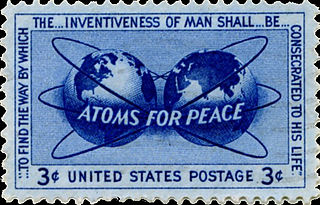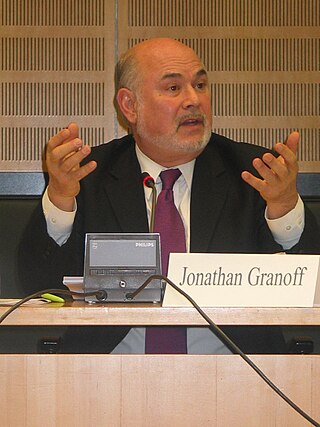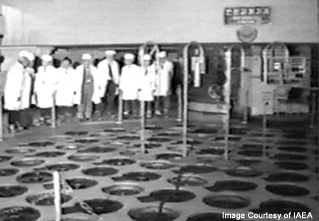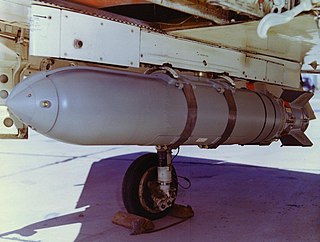Related Research Articles

The Treaty on the Non-Proliferation of Nuclear Weapons, commonly known as the Non-Proliferation Treaty or NPT, is an international treaty whose objective is to prevent the spread of nuclear weapons and weapons technology, to promote cooperation in the peaceful uses of nuclear energy, and to further the goal of achieving nuclear disarmament and general and complete disarmament. Between 1965 and 1968, the treaty was negotiated by the Eighteen Nation Committee on Disarmament, a United Nations-sponsored organization based in Geneva, Switzerland.

Nuclear proliferation is the spread of nuclear weapons, fissionable material, and weapons-applicable nuclear technology and information to nations not recognized as "Nuclear Weapon States" by the Treaty on the Non-Proliferation of Nuclear Weapons, commonly known as the Non-Proliferation Treaty or NPT. Proliferation has been opposed by many nations with and without nuclear weapons, as governments fear that more countries with nuclear weapons will increase the possibility of nuclear warfare, de-stabilize international or regional relations, or infringe upon the national sovereignty of nation states.

The Euro-Atlantic Partnership Council (EAPC) is a post–Cold War, North Atlantic Treaty Organization (NATO) institution. The EAPC is a multilateral forum created to improve relations between NATO and non-NATO countries in Europe and Central Asia. States meet to cooperate and discuss political and security issues. It was formed on 29 May 1997 at a Ministers’ meeting held in Sintra, Portugal, as the successor to the North Atlantic Cooperation Council (NACC), which was created in 1991.

Stockholm International Peace Research Institute (SIPRI) is an international institute based in Stockholm. It was founded in 1966 and provides data, analysis and recommendations for armed conflict, military expenditure and arms trade as well as disarmament and arms control. The research is based on open sources and is directed to decision-makers, researchers, media and the interested public.

"Atoms for Peace" was the title of a speech delivered by U.S. President Dwight D. Eisenhower to the UN General Assembly in New York City on December 8, 1953.
I feel impelled to speak today in a language that in a sense is new—one which I, who have spent so much of my life in the military profession, would have preferred never to use. That new language is the language of atomic warfare.

The United Nations Peacebuilding Commission (PBC) is a United Nations intergovernmental advisory body of both the General Assembly and the Security Council that supports peace efforts in conflict affected countries. A key addition to the capacity of the international community in the broad peace agenda, it was established in 2005 with the passage of both A/RES/60/180 and S/RES/1645 Rabab Fatima is the incumbent chair of PBC.
Strategic Foresight Group (SFG) is a think tank based in India that works on global issues. It was established in 2002.

The Fund for Peace is an American non-profit, non-governmental research and educational institution. Founded in 1957, FFP "works to prevent violent conflict and promote sustainable security."

Jonathan Granoff is an American lawyer, screenwriter and lecturer, widely known as President of the Global Security Institute.

United Nations Security Council resolution 1540 was adopted unanimously on 28 April 2004 regarding the non-proliferation of weapons of mass destruction. The resolution establishes the obligations under Chapter VII of the United Nations Charter for all member states to develop and enforce appropriate legal and regulatory measures against the proliferation of chemical, biological, radiological, and nuclear weapons and their means of delivery, in particular, to prevent the spread of weapons of mass destruction to non-state actors.

United Nations Security Council Resolution 1928, adopted unanimously on June 7, 2010, after recalling resolutions 825 (1993), 1540 (2004), 1695 (2006), 1718 (2006), 1874 (2009) and 1887 (2009) on the topics of North Korea and nuclear weapons, the Council extended the mandate of a panel of experts monitoring sanctions against the country until June 12, 2011.

United Nations Security Council resolution 1478, adopted unanimously on 6 May 2003, after recalling resolutions 1132 (1997), 1171 (1998), 1306 (2000), 1343 (2001), 1385 (2001), 1395 (2002), 1400 (2002), 1408 (2002), 1458 (2003), 1467 (2003) and others on the situation in Liberia, the Council extended sanctions against the Liberian government for an additional period of twelve months until 7 May 2004 and imposed a ban on imports of its timber for ten months.

United Nations Security Council resolution 1521, adopted unanimously on 22 December 2003, after recalling all previous resolutions on the situation in Liberia and West Africa, the council established a monitoring body to oversee international sanctions against Liberia. It was the final Security Council resolution adopted in 2003.

The Center on International Cooperation (CIC) is a foreign policy think tank based at New York University that works to enhance multilateral responses to global problems, including conflict, humanitarian crises, and recovery; international security challenges, including weapons proliferation and the changing balance of power; resource scarcity and climate change. It was founded in 1996 by Dr. Shepard Forman.

United Nations Security Council Resolution 1984, adopted on June 9, 2011, after recalling resolutions 1696 (2006), 1737 (2006), 1747 (2007), 1803 (2008), 1835 (2008), 1887 (2009) and 1929 (2010) concerning Iran and non-proliferation, the Council extended the mandate of an expert panel monitoring sanctions against the country over its nuclear program for a period of one year.

United Nations Security Council Resolution 1985, adopted unanimously on June 10, 2011, after recalling resolutions 825 (1993), 1540 (2004), 1695 (2006), 1718 (2006), 1874 (2009), 1887 (2009), 1928 (2010) on the topics of North Korea and nuclear weapons, the Council extended the mandate of an expert panel monitoring sanctions against the country until June 12, 2012.

United Nations Security Council Resolution 1673, adopted unanimously on April 27, 2006, after considering a report from the Committee of the Security Council established in Resolution 1540 (2004) concerning non-proliferation, the Council extended the mandate of the Committee monitoring the resolution's implementation concerning weapons of mass destruction and their means of delivery until April 27, 2008.

United Nations Security Council Resolution 2017 was unanimously adopted on 31 October 2011.

The G7-led Global Partnership Against the Spread of Weapons and Materials of Mass Destruction is an international security initiative announced at the 2002 G8 summit in Kananaskis, Canada, in response to the September 11 attacks. It is the primary multilateral group that coordinates funding and in-kind support to help vulnerable countries around the world combat the spread of weapons and materials of mass destruction (WMDs).

The 2017 Nobel Peace Prize was awarded to the International Campaign to Abolish Nuclear Weapons (ICAN) "for its work to draw attention to the catastrophic humanitarian consequences of any use of nuclear weapons and for its ground-breaking efforts to achieve a treaty-based prohibition on such weapons," according to the Norwegian Nobel Committee announcement on October 6, 2017. The award announcement acknowledged the fact that "the world's nine nuclear-armed powers and their allies" neither signed nor supported the treaty-based prohibition known as the Treaty on the Prohibition of Nuclear Weapons or nuclear ban treaty, yet in an interview Committee Chair Berit Reiss-Andersen told reporters that the award was intended to give "encouragement to all players in the field" to disarm. The award was hailed by civil society as well as governmental and intergovernmental representatives who support the nuclear ban treaty, but drew criticism from those opposed. At the Nobel Peace Prize award ceremony held in Oslo City Hall on December 10, 2017, Setsuko Thurlow, an 85-year-old woman Who survived the 1945 atomic bombing of Hiroshima, and ICAN Executive Director Beatrice Fihn jointly received a medal and diploma of the award on behalf of ICAN and delivered the Nobel lecture.
References
- ↑ "High Level Panel on Threats, Challenges and Change". globalpolicy.org. Global Policy Forum . Retrieved 30 November 2014.
- 1 2 3 High-level Panel on Threats, Challenges and Change (2004). A More Secure World: Our Shared Responsibility: Report of the Secretary-General's High-level Panel on Threats, Challenges and Change (PDF). United Nations. Retrieved 22 May 2020.